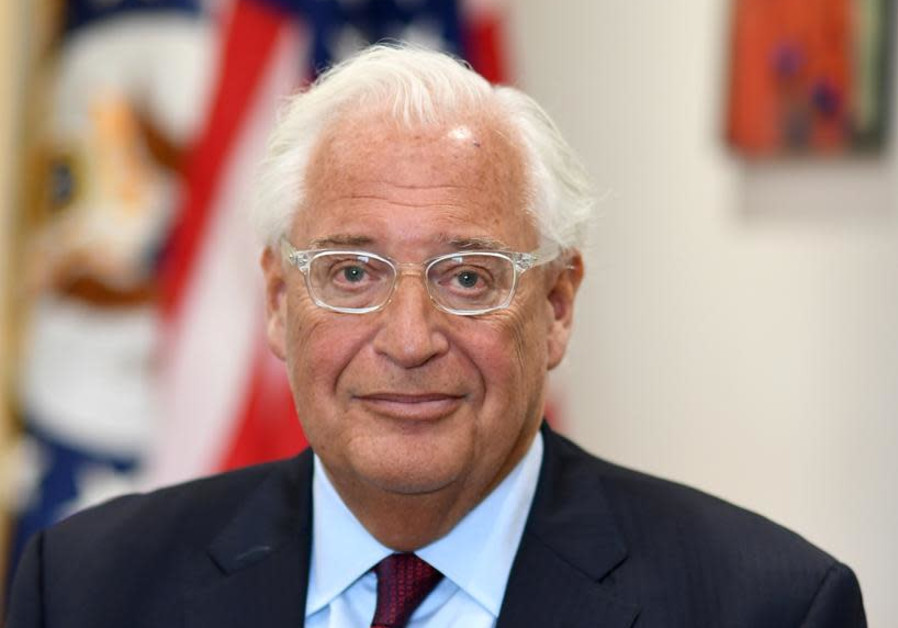Friedman to ‘Post’: U.S. thinking ‘out of the box’ with Trump peace plan

US Ambassador David Friedman. (photo credit: MATTY STERN/US EMBASSY JERUSALEM)
The Trump administration peace plan is an effort to “think out of the box and capture the imagination and hopes of both sides for a better life,” US Ambassador David Friedman told The Jerusalem Post on Wednesday, explaining why Washington is pressing ahead with the plan even as neither the Palestinians nor the Israelis seem overly enthusiastic.
“I don’t think there is a lack of interest; I think there is exhaustion and frustration from so many previous failed efforts,” Friedman said.
Friedman is part of the team – including Trump senior adviser and son-in-law Jared Kushner and Special Representative for International Negotiations Jason Greenblatt – that has been working long on the plan. Kushner said on Tuesday that it will be rolled out “after Ramadan,” which this year ends on June 4.
While some are advising the administration against presenting the plan since it will surely be rejected by the Palestinian Authority – and as a result might only make a bad situation worse – Friedman said that the administration is continuing to “calibrate” matters and is “cognizant of all the factors implicated by the roll out.”
Asked about the rationale of unveiling the plan if the Palestinians have already rejected it, Friedman drew a distinction between the Palestinian people and its leadership.
“The Palestinian people deserve the opportunity to consider a meaningful alternative to the status quo, as does Israel,” he said. “We see value in presenting that vision, even if the initial Palestinian leadership reaction is negative.”
Kushner, in comments on Tuesday, said the administration is approaching the issue differently than others have in the past. While past efforts have focused on getting peace talks started in the hope that they will lead to an agreement, the idea behind this plan is to start by laying out a solution “and then we’ll work on a process to try to get there.”
Friedman explained this approach, saying: “Our view is that people need to understand the endgame before they begin.”
“There have been many ‘bridges to nowhere’ precisely because everyone was focused on the process, even to the exclusion of the result,” he said. “History tells us that this approach will continue to fail.”
The US ambassador walked around the question of whether last month’s US recognition of Israeli sovereignty over the Golan Heights was – as some have speculated – a prelude to giving a green light to Israel extending sovereignty over the settlement blocs in the West Bank.
“The Golan decision was based upon the reality that Israel has governed the Golan for 52 years and there exists no scenario whereby Israel could have a safe and secure border with Syria – a dangerous and despotic regime – except by retaining full sovereignty over the Golan Heights,” Friedman said.
The ambassador did not directly address whether this was a precedent that might now be used in the West Bank.
He dismissed as “nonsense” comments made Tuesday by PA Prime Minister Mohammed Shtayyeh that the US decisions to cut aid to UNRWA and recognize Jerusalem as Israel’s capital were designed to “punish” and ‘blackmail” the Palestinians because of the peace process stalemate.
“We have never looked at any cut to financial aid as punishment or blackmail,” he said. “Funding decisions are made by the administration solely on the basis of whether they receive a return – be it diplomatic, humanitarian or otherwise – on hard-earned taxpayer money.”
Regarding the embassy relocation to Jerusalem, Friedman said that Trump “simply fulfilled the will of the American people that numerous presidents before him promised, but failed, to actualize. His decision was grounded in history, truth and fact.”
The ambassador was asked whether he was concerned that some of what Trump has done for Israel – including both the Jerusalem and Golan moves – might be reversed if progressive Democrats like Bernie Sanders, Elizabeth Warren or Beto O’Rourke were to be elected president in 2020.
“Everything we’ve done has been in the best interests of the United States and its citizens,” he maintained. “I can’t get into a political discussion, but I strongly believe that what President Trump has done in this region should and will be preserved, well beyond his remaining (hopefully six) years in office.”
As to Prime Minister Benjamin Netanyahu’s suggestion Tuesday to name a community or neighborhood on the Golan Heights after Trump in gratitude for his decision to recognize Israeli sovereignty there, Friedman said he was sure that Trump “appreciates the prime minister’s sentiment.”
Join Jerusalem Post Premium Plus now for just $5 and upgrade your experience with an ads-free website and exclusive content. Click here>>






Comments are closed.